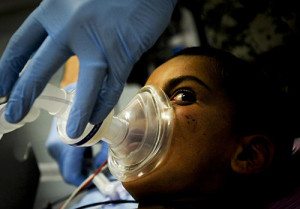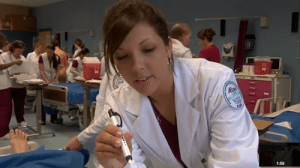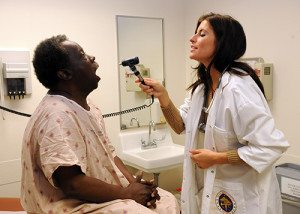
Top nursing jobs are in management and administration, but also still in the direct care of patients, so you can advance your career in many roles! Nursing is one of the fastest-growing occupations in the US, due to the massive growth of the American healthcare system in the era of the Affordable Care Act. We have seen a shortage of nurses across the nation for over a decade, and that shortage has resulted in a job market that rewards education, experience, and excellence in nursing professionals. In some nursing occupations, the job market is expected to grow by as much as 31%. There are rewarding, high-paying jobs at every level of nursing education, from the Associate’s Degree in Nursing to the Doctor of Nursing Practice, and the best nursing jobs don’t necessarily require the highest level of education.
In fact, there is a wide range in the types of nursing jobs and salaries that are available in the modern age of nursing, from highly specialized, technology-based careers like nursing informatics, to advanced practice care, to corporate positions and nursing research. American nurses are some of the highest-paid nurses in the world, and the top paying nursing jobs offer salaries and benefits well into six figures. Some of the best nursing careers are listed below in management and direct care. After all, healing is the reason most nurses get into nursing in the first place.
Featured Programs
Jobs are ranked from highest to lowest average salary, according to Payscale data. In addition, Nursing School Hub editors consulted the Bureau of Labor Statistics for information about job market growth and expected education levels.
1. Certified Registered Nurse Anesthetist

With an average salary of around $164,800, the Certified Registered Nurse Anesthetist (CRNA) position tops the list of the highest-paid nursing jobs in the world. Late-career CRNAs who have been working in the field for 20 years or more often make more than $208,000. A nurse anesthetist usually works at a hospital, clinic, or private practice as part of a team that often includes an anesthesiologist. Job responsibilities include determining the type and amount of anesthesia required, administering anesthesia, explaining procedures to patients, and helping patients remain calm before and during the procedure.
Nurse anesthetists typically need to possess a Doctor of Nursing Practice (DNP) degree and certification as a nurse anesthetist. Requirements for licensing can vary from one state to another. Certified registered nurse anesthetists often work long hours and must be able to work well under pressure. The job often involves a lot of standing and walking. The ten-year job growth outlook for nurse anesthetists is 31%.
Education Needed: DNP
Average Salary: $164,800
Job Growth: 31%
2. Chief Nursing Officer/Executive

Chief Nursing Officer (CNO) is one of the top-paying nursing jobs with an average salary of around $135,000. Chief Nursing Officers with many years of experience can earn as much as $203,000. Job responsibilities include managing schedules for the nursing staff, helping to develop strategies and procedures for the nursing department that are in line with hospital policies, overseeing training and educational programs for the nursing staff, monitoring the quality of services provided, and ensuring compliance with government regulations.
This executive-level position requires an MSN or DNP degree and licensing from the state. Leadership skills are essential, and prior management experience is often required. Chief Nursing Officer is one of the best nursing jobs for nurses who want to be involved in management. This job has a projected 20% ten-year growth rate, so it is likely that more CNOs will be needed in years to come, and most CNOs report being extremely satisfied with their work.
Education Needed: MSN/DNP
Average Salary: $135,000
Job Growth: 20%
3. Cardiovascular Perfusionist

A cardiovascular perfusionist is one of the best nursing careers for those with an interest in heart health. Another closely related position is the cardio-pulmonary perfusionist, which includes a focus on the lungs as well as the heart. This position has an average salary of $134,000. It requires the nurse to monitor surgical patients and oversee the operation of the heart and lung machines that keep the patient alive during surgery. The cardiovascular or cardio-pulmonary perfusionist also administers medications, which may include certain anesthetics.
The cardiovascular perfusionist must have strong teamwork skills in order to communicate potential with the surgeon about any problems that arise during surgery. An MSN degree and certification from the American Board of Cardiovascular Perfusion are required for these types of nursing jobs, and salaries can reach as much as $176,000 by the end of a perfusionist’s career. Cardiovascular perfusionists often work very long hours in hospital settings and may be required to help train residents and students. There is a 31% projected ten-year growth rate for this job.
Education Needed: MSN
Average Salary: $134,000
Job Growth: 31%
4. Orthopedic Nurse Practitioner

Orthopedic nurse practitioners are also among the highest-paid nurses in the world, with an average salary of $101,000. An orthopedic nurse practitioner usually works in the orthopedic surgery department in a hospital setting. Job responsibilities include providing primary health care for orthopedic patients, assessing and examining patients, ordering laboratory tests, and serving as an intermediary between surgical and medical services. The orthopedic nurse practitioner also helps orthopedic patients obtain ancillary services as needed.
To become an orthopedic nurse practitioner, you must obtain an MSN or higher and obtain nurse practitioner certification. You must also be licensed to practice in the state where you will be working. The job outlook for this career is very good, with a projected ten-year growth rate of 31%.
Education Needed: MSN
Average Salary: $101,000
Job Growth: 31%
5. Psychiatric Nurse Practitioner

Nurses with an interest in mental health will be interested to discover that psychiatric nurse practitioner is one of the top-paying nursing jobs in the US, with an average salary of around $112,800 per year. Psychiatric nurse practitioners treat patients with anxiety, depression, ADHD, schizophrenia, bipolar disorder, and other mental illnesses and help them manage their conditions. They complete evaluations and monitor their patients’ progress. Psychiatric nurse practitioners often work with a psychiatrist in order to be able to provide a more robust range of mental health services to their patients. They may administer medication and make adjustments to the dosage based on feedback from the patient on whether the medication is achieving the desired results.
Nurses who wish to become psychiatric nurse practitioners must complete an MSN or DNP and become registered nurse practitioners. A degree with a focus in psychiatric nursing is preferred. Licensing requirements vary from state to state. Strong communication skills are essential. Psychiatric nurse practitioners must be patient and caring since they often work with patients who have serious mood disorders. This career has a positive anticipated ten-year growth rate of 31%.
Education Needed: MSN/DNP
Average Salary: $112,800
Job Growth: 31%
6. Acute Care Nurse Practitioner

An acute care nurse practitioner is one of the best nursing jobs for people who enjoy dealing with emergencies and trauma. The average salary is $105,000, and acute care nurse practitioners may work in emergency, trauma, critical care, intensive care, and other areas where patients receive treatment for acute conditions that require immediate care. Acute care nurse practitioners assess patients, provide medication and other treatments, and communicate information about treatments to patients and their families. They also monitor equipment and conduct check-ups on patients to determine the effectiveness of their treatments.
To become an acute care nurse practitioner, you must complete an MSN or DNP and obtain any certifications or licenses required by the state where you will be working. Acute care nurse practitioners need strong communication skills and must be able to work well with others as part of a team. They must be organized and be able to perform their duties with minimal supervision. The job outlook for this career is very high, with a 31% projected ten-year growth rate.
Education Needed: MSN/DNP
Average Salary: $105,000
Job Growth: 31%
7. Certified Nurse Midwife

Certified nurse-midwives earn an average of $100,100 per year. This is one of the best nursing careers for nurses who enjoy working with women, specifically mothers-to-be. Certified nurse-midwives provide family planning services and prenatal and gynecological care to their patients as well as helping guide women through the labor and delivery process. They also provide information about pregnancy and the care of newborns to pregnant women. Certified nurse-midwives may work in hospitals, private clinics, public health departments, or educational facilities.
Certified nurse-midwives are usually required to have at least a bachelor’s degree in nursing, but an MSN or DNP is preferred. A degree with a specialty in midwifery is preferred. In addition, certified nurse-midwives must pass the exam to become registered nurses (RNs). To be successful in this career path, certified nurse midwives need to be able to handle stressful medical situations and demonstrate concern and empathy for their patients. Good communication skills are essential. The projected ten-year growth outlook for this career is 31%.
Education Needed: MSN/DNP
Average Salary: $100,100
Job Growth: 31%
8. Family Nurse Practitioner

A family nurse practitioner performs many of the same duties as a family physician, including diagnosing and treating illnesses and prescribing medications. Many insurance companies allow family nurse practitioners to be considered primary care providers for insurance purposes. Family nurse practitioners work with patients of all ages, from infants to senior citizens. Most family nurse practitioners work in private practice alongside a physician and their services complement those of the physician.
To become a family nurse practitioner, you must first become a registered nurse (RN) and earn an MSN or DNP degree. Training to become a family nurse practitioner usually includes clinical experience in the form of an internship or residency. This position is expected to grow at a rate of 31% over ten years.
Education Needed: MSN/DNP
Average Salary: $98,000
Job Growth: 31%
9. Women’s Health Nurse Practitioner

Another great career for nurses who want to work with women is the women’s health nurse practitioner. Women’s health nurse practitioners are advanced practice registered nurses (APRNs) who focus on women’s health concerns. They perform many of the same duties as a certified nurse-midwife, but typically don’t focus specifically on pregnancy or labor and delivery services. Women’s health nurse practitioners administer pap smears and mammograms to screen for cancer and provide their patients with information about birth control and other reproductive health concerns.
A woman’s health nurse practitioner must be certified as an advanced practice registered nurse (APRN), which requires extensive education, training, and testing. An MSN or DNP degree is required. Employers tend to favor candidates who have prior experience in reproductive health or neonatal care. The expected ten-year job growth for this career is 31%.
Education Needed: MSN/DNP
Average Salary: $87,500
Job Growth: 31%
10. Pediatric Nurse Practitioner

If you enjoy working with children, a pediatric nurse practitioner may be one of the best types of nursing jobs, and salaries average $93,000 per year. A pediatrics nurse practitioner often works in the pediatrics ward in a hospital or other medical facility. Their patients are usually young and chronically ill. Job responsibilities include helping to prescribe and administer treatments and medications to young patients. They usually work closely with physicians and have a limited ability to make diagnoses and prescribe medication. Pediatric nurse practitioners who work in hospitals are often required to do shift work and may have to work evenings or overnight.
Since pediatric nurse practitioners work with children, they must be patient, compassionate, and have a knack for building rapport with young patients and their families. To become a pediatric nurse practitioner, you must first earn an MSN or DNP and then obtain any licenses and certifications required by the state. The projected ten-year job growth rate for this career is lower than for many other nursing careers but is still strong at 20%.
Education Needed: MSN/DNP
Average Salary: $93,000
Job Growth: 20%
11. Clinical Nurse Specialist

Clinical nurse specialists work in a specialized clinic or unit, such as pediatrics, oncology, or emergency medicine. They are advanced practice registered nurses (APRNs) who focus on improving the quality of nursing care in their specialties. Job responsibilities of clinical nurse specialists include teaching new patient care techniques to other nurses and analyzing patient outcomes to determine ways to improve the standard of care in their departments. Clinical nurse specialists also provide medical assessments and care for their patients.
A master’s degree in nursing and RN certification is required to become a clinical nurse specialist. In some states, a clinical nurse specialist (CNS) certification is also required. Clinical nurse specialists may be required to work a non-standard schedule that includes nights, weekends, and/or overtime. They must have good communication since they often work closely with doctors, technicians, support staff, and other nurses. The projected ten-year growth rate for this career is 31%.
Education Needed: MSN
Average Salary: $93,000
Job Growth: 31%
12. Corporate Nurse

Corporate nurses work in settings that are not typical health care facilities, such as pharmaceutical companies, insurance companies, consulting firms, and companies that manufacture medical equipment. The average salary for this position is $82,000. Corporate nurses typically work regular hours and have weekends and holidays off. They don’t treat patients directly but do have an impact on how patients are treated. This career choice is less stressful than many other nursing careers and is a path that is often pursued by nurses who have become burned out working in other, more stressful nursing jobs.
Corporate nurses usually possess a BSN or MSN degree and RN certification is typically required. These positions usually require administrative and leadership skills. Corporate nurses are employed by companies that develop products and services for the medical industry and are able to impact the care of many patients by providing feedback on new products and helping to shape health care policies and procedures. The ten-year job growth projection for this career is much lower than for most other nursing careers at 15%.
Education Needed: BSN/MSN
Average Salary: $82,000
Job Growth: 15%
13. Nursing Director

One of the best nursing jobs for nurses with management aspirations is nursing director, which has an average annual salary of $94,000. This is a high-level management position. Nursing directors are responsible for ensuring that the needs of the nursing staff are met and making sure the entire nursing unit performs well. Job responsibilities include planning and organization, supervising other nurses, evaluating their performance, and making sure the unit is in compliance with hospital policies and government regulations.
If you want to become a nursing director, you must first become a registered nurse (RN) and hold a bachelor’s or master’s degree in nursing. Since the nursing director is a high-level management position, it is usually necessary for a nurse to have several years of management experience in lesser roles before assuming the position of nursing director. The ten-year outlook for growth in this career field is 20%.
Education Needed: BSN/MSN
Average Salary: $94,000
Job Growth: 20%
14. Nurse Researcher

Nurse Researchers are among the highest-paid nurses in the world with a base salary of $63,000 and a top salary of over $147,000. The average nurse researcher will earn about $82,000. A research nurse studies and researches disease by analyzing previous research and current patients. They will organize, and assist with clinical trials to study new medications or learn new forms of treatment. They often are responsible for finding appropriate candidates for trials and they must analyze the patient’s past and present health.
Research nurses will work in many various settings such as pharmaceutical businesses, universities, government, or research organizations. They do require specialized training. They can find entry-level work with a nursing bachelor’s degree, it’s best for them to have a master’s, or doctorate in their research specialty. A research nurse student will have to take statistics and research-based classes. There are certifications a research nurse must have from the Association of Clinical Research Professionals. They are a Certified Clinical Research Associate or a Certified Clinical Research Coordinator. First, the nurse must have thousands of hours of clinical research as a registered nurse.
Education Needed: BSN/MSN
Average Salary: $82,000
Job Growth: 15%
15. Nursing Informatics Analyst

There are many various types of nursing jobs and salaries. One is a Nursing Informatics Analyst, with a base pay of around $56,000 and a top salary of $107,000. The average pay is about $80,000 with a 15% expected job growth in this field. A nursing informatics analyst works within a nursing department in organizations and analyzes trends and uses technology to improve patient health and care. They help guide sound decisions within their work environment by providing solid information. They may maintain and calibrate equipment.
A Nursing Informatics Analyst must receive a Bachelor of Nursing (BSN), but a Master’s of Nursing (MSN) is suggested. After receiving the degree, a student must pass the National Council Licensure Examination (NCLEX) to get licensed. Then, the nurse will need special credentials and certifications. For those with less than five years of experience, there is the Certified Associate in Healthcare Information Management Systems (CAHIMS). For those with IT experience, Certified Professional in Healthcare Information and Management Systems (CPHIMS) Informatics analysts can find jobs as nurse managers in hospitals, nursing organizations, nurse programmers, or vendor representatives.
Education Needed: BSN/MSN
Average Salary: $80,000
Job Growth: 15%
16. Certified Nephrology/Dialysis Nurse

Certified Nephrology or Dialysis Nurse is one of the top paying nursing jobs with a salary of around $97,000 per year. A certified nephrology or dialysis nurse diagnoses, treats, and educates patients with kidney problems. They will discuss the patient’s full history including current symptoms. They may help with imaging and diagnostic exams and procedures. They provide care to those receiving dialysis by giving medication and hooking up patients to machines to filter their blood.
Certified nephrology or dialysis nurse works in doctors’ offices, clinics, and hospitals. These nurses must first become licensed registered nurses, by graduating from a nursing program and passing the National Council Licensure Examination for Registered Nurses (NCLEX-RN). After completing 3,000 experience hours in a nephrology clinic and 30 credit hours of education in nephrology, the nurse must pass the Certified Nephrology Nurse Certification given through the Nephrology Nursing Certification Commission (NNCC).
Education Needed: ADN/BSN RN
Average Salary: $97,000
Job Growth: 15%
17. Head Nurse

One of the best nursing careers is a Head Nurse, with a salary range of $36,000 to $107,000, and the average salary is $68,000. A head nurse manages nursing staff and patients. A head nurse has a unit of nurses that reports to the head nurse and interacts with the head nurse when guidance is needed for a problem. A head nurse is responsible for following doctors’ orders for the care of a patient, as well as determining the needs and treatments of a patient and that patient’s care. A head nurse determines schedules and rotations for nurses, as well as participates in the hiring and firing of nurses.
Head nurses often coordinate with multiple disciplines for complex cases. They must ensure privacy and safety is followed at all time. A head nurse must have a bachelor’s degree in nursing (BSN) and often a Master’s degree in nursing (MSN) with appropriate clinical rotations. Head nurses often work in hospitals, clinics, or patient health facilities.
Education Needed: BSN/MSN
Average Salary: $68,000
Job Growth: 15%
18. Case Management Nurse

A Case Management Nurse is one of the best nursing jobs with a base salary of $60,000 and a top salary of $93,000. The average salary is $75,000. Typical job requirements of a case management nurse are to understand the needs of the patient and consult with other physicians about the patient’s care. Each patient of a nurse care manager is different, with different needs and care plans. They consider the patient’s wants and needs while developing a proper care plan. The nurse care manager is the first point of contact for the patient. They provide support and information to the patient during the patient’s care. The nurse care manager constantly interacts with the patient and is aware of any and all changes.
A nurse care manager can work in almost any facility like hospitals, private practices, and clinics. They may also work in hospice centers, nursing homes, and home healthcare organizations. A nurse care manager must be a registered nurse (RN) with a Bachelor’s degree in Nursing (BSN). The student must pass the National Council Licensure Examination for Registered Nurses (NCLEX-RN). They should have at least two years of experience working in clinical settings. They should receive case management certification from the American Case Management Association (ACMA).
Education Needed: BSN/MSN
Average Salary: $75,000
Job Growth: 20%
19.  Perioperative Nurse
Perioperative Nurse
A Perioperative Nurse is a registered nurse that works in the operating room. They are also referred to as surgical nurses. They have a base salary of $55,000 and a top salary of $99,000, with an average salary of $71,000. Surgical nurses work with patients to describe the procedure, give pre-op instructions, and help prep the patient for surgery. This may include taking vital signs, starting IV lines, giving medications, and assisting the surgeon. Surgical nurses monitor the patient during surgery and alert the surgeon of any concerns. They often take the patient from surgery to post-op and ensure there is a smooth transition.
Surgical Nurses work in the surgical wards and operating rooms, emergency care, and trauma centers. A surgical nurse must first become a registered nurse with a bachelor’s degree in nursing. They must pass the National Council Licensure Examination for Registered Nurses (NCLEX-RN). Experience working in an ICU or recovery area is helpful, but not necessary. A master’s degree in nursing is welcomed, and an internship or residency in the surgical ward. Then the RN must take and pass the Certified Medical-Surgical Registered Nurse Examination (CMSRNE).
Education Needed: ADN/BSN RN
Average Salary: $71,000
Job Growth: 15%
20. Certified Oncology Nurse

A Certified Oncology Nurse earns anywhere between $49,620 and $91,882, with a base salary of $68,000. A Certified Oncology Nurse treats cancer patients and assists oncologists in providing care to those often terminally ill. They often deliver medication through IVs. A Certified Oncology Nurse must be able to talk to patients and their families and explain the medical details of their condition, as well as treatment. They develop care plans for when the patient leaves the facility. Safety and hygiene are the top priority to an oncology nurse.
Oncology nurses first must be registered nurses (RNs), with a Bachelor of Science in Nursing degree. The RN must take classwork specific to the care of cancer, as well as clinical practice. They must take the Oncology Certified Nurse exam. For those wanting to become an oncology nurse practitioner, they need a Master of Science in Nursing (MSN) degree, followed by the state nursing board recognition as an advanced practice nurse. An oncology nurse practitioner needs at least 500 hours of practice in a clinic that’s supervised in oncology to take the Advanced Oncology Certified Nurse Practitioner (AOCNP) exam.
Education Needed: BSN
Average Salary: $68,000
Job Growth: 15%
21. Disease Management Nurse

A Disease Management Nurse earns an average of $66,500 per year. A disease management nurse attempts to help the patient manage his own care by providing tools and resources, for diseases such as asthma, diabetes, or coronary artery disease. They help to improve the health of patients by monitoring that the patient is following orders and providing ongoing updates and evaluations. They create a targeted care plan for the patient.
A disease management nurse can work in hospitals, doctors’ offices, long-term health facilities, and outpatient facilities. They must first become a registered nurse (RN) with a Bachelor’s degree in Nursing (BSN). They must have experience working in the nursing field as an RN. They must receive additional training and coursework in case management. Finally, a disease management nurse must receive a case manager certification.
Education Needed: BSN/MSN
Average Salary: $66,500
Job Growth: 15%
22. Pediatric Endocrinology Registered Nurse

The salary for a Pediatric Endocrinology Registered (PED ENDO) Nurse ranges from $36,766 to $80,091, with a base salary of $64,000. They work with babies, small children, teens, and young adults who have endocrine disorders. They assist pediatric endocrinologists in treating patients with intersex disorders and physical growth disorders, like growth delays. They also assist patients with things like hypoglycemia, endocrine gland disorders, and diabetes.
A PED ENDO nurse often works in children’s health facilities, hospitals, or private practice. They may have jobs as a diabetes management nurse, diabetes educator, a nurse that tests endocrinology, or a clinical nurse. A PED ENDO must have a Bachelor of Science in Nursing (BSN), then has to pass the state certification NCLEX-RN examination and earn Pediatric Endocrinology Certification. Someone interested in becoming a PED ENDO should have pediatric nursing, endocrinology, and internal medicine experience.
Education Needed: BSN
Average Salary: $64,000
Job Growth: 15%
23. Hospice Nurse

A Hospice Nurse earns between $50,467 to $83,517, with an average salary of $63,500. A hospice nurse takes care of terminal, convalescing, and elderly patients. They create a plan for patient care and ensure it’s followed. They are part of a team of multiple disciplines working for the treatment of a patient. They document and communicate the care plan with the patient and family. They ensure the patient is comfortable and has all he or she needs while in hospice. They typically work at hospice centers, but can also provide in-home hospice care.
A Hospice Nurse first becomes a registered nurse (RN) with a Bachelor’s degree in Nursing (BSN). Then they must pass the National Council Licensure Examination for Registered Nurses (NCLEX-RN). They must have 500 hours in the past year, or 1,000 hours in the past two years of hospice experience before being eligible to take the Certified Hospice and Palliative Nurse (CHPN) Exam.
Education Needed: ADN/BSN
Average Salary: $63,500
Job Growth: 15%
24. Pain Management Nurse

A Pain Management Nurse earns between $28,000 to $78,000, with an average salary of $60,000. Pain management nurses review patients’ history and current condition to understand the level and reasons for their pain. They examine patients and talk about their symptoms. The main function of a pain management nurse is to help patients manage pain. Pain management nurses will give pain-relieving medications and teach patients the way to take them safely and provide alternatives such as acupuncture, massage, and exercise.
Pain management nurses have a Bachelor of Science in Nursing. They must pass the National Council Licensure Examination to obtain a license as a registered nurse. Then they must receive certification in pain management through the American Society for Pain Management Nursing.
Education Needed: BSN
Average Salary: $60,000
Job Growth: 15%
25. Neonatal NICU Nurse

A Neonatal (NICU) Nurse earns $48,783 to $97,322, with an average of $61,000. A NICU nurse specializes in care for premature newborns or babies that have issues requiring intensive care. They work with a team of professionals within the NICU. They are trained to work with all classes of neonatal care. A NICU registered nurse provides emotional support and information to the family of the newborn. NICU registered nurses can find employment in public and private hospitals.
A NICU registered nurse must have a bachelor’s degree in nursing. Most hospitals want the nurse to have specialized in neonatal care courses. A nurse is required to pass a state licensing examination. A registered nurse needs at least twelve months of experience before working in a NICU.
Education Needed: BSN/MSN
Average Salary: $61,000
Job Growth: 15%
What Education Do I Need for the Top Paying Nursing Jobs?
Nursing is a dynamic career path with many types of nursing jobs and salaries available to degree holders. Nursing specialists remain in high demand, enjoying nursing careers that include some top-paying nursing jobs. According to the federal Bureau of Labor Statistics (BLS), the nursing industry’s anticipated job growth significantly outpaces national averages in regard to the different types of nursing jobs and salaries.
The history of nursing has taught us that earning a Bachelor of Science in Nursing or an even more advanced degree (i.e. master’s or doctoral degree) has a positive impact on promotion and advancement and on salary level. In fact, in the field of nursing, each advanced degree has been shown to be well worth the time, money, and effort. The different levels of nursing and salaries are generally contingent upon the degree as well as the specialty.
Upon completing your Master of Science in Nursing, career opportunities break open when compared to the baccalaureate education level. Nursing professionals when they earn a doctorate degree will find that they can become some of the highest-paid nurses in the world.
In addition to the availability of some top-paying nursing jobs, Doctoral degree holders have an opportunity to influence future health care practices and protocols. The highest-paid nurses in the world often choose to become university professors to attain personal satisfaction.
When considering nursing career paths and objectives, remember to consider them in terms of the different levels of nursing and salaries. The level of degree one holds has a direct impact on one’s lifetime earning potential.
Do I Need a Higher Degree to Get a High-Paying Nursing Job?
Earning a nursing degree prepares graduates for varied nursing career options. While the benefits of a master’s degree in nursing include an elevated MSN salary, it is noted that there are many specialty nursing positions for those with a baccalaureate degree in nursing that have increased salaries and benefits without a more advanced degree.
An MSN salary increase is just one of the many benefits of a master’s degree in nursing. However, it is important to avoid viewing the MSN salary increase as the only criteria for selecting the level of nursing degree to be earned.
Certain nursing baccalaureate degree holders can increase their earning potential by completing specialty certificates from on-campus or online programs. An aspiring nurse is on the path to gaining the nursing credentials for a long successful career.
A doctoral degree in nursing will offer more influential leadership role opportunities with compensation packages that surpass the benefits of a master’s degree in nursing. The salary and differentials between a bachelor’s degree and a master’s degree exceed the difference be a master’s degree and a doctorate – a phenomenon often referred to as the law of diminishing returns.
What Are the Best Jobs I Can Get With an RN License?
As noted above, the nursing industry depends on nursing personnel with advanced degrees and specialty degrees for the best nursing jobs. The demand for nursing professionals continues to outpace the national average for occupations. To provide some perspective, in 2017, the median pay for a Registered Nurse was $33.65 per hour or $70,000 annually.
Comparing an RN vs BSN salary amounts to understanding that the effort required to earn a BSN exceeds that of an RN. The best nursing careers with a bachelor’s include the following nursing positions, listed in order of the salaries offered for the best nursing jobs and the best nursing careers:
- Nursing Director ($83,000)
- Nurse Researcher ($81,500)
- Nursing Informatics Analyst ($80,000)
- Certified Nephrology/Dialysis Nurse ($78,000)
Considering the higher rates for all of these positions which require at least a BSN, and often an MSN, it’s clear that RN vs BSN salary is a considerable difference. The reality is that the right nursing position for any nursing professional is only partially contingent on comparing an RN vs BSN salary perspective, it also depends on the career objectives and personal goals of the dedicated nurse.
Related:
 Perioperative Nurse
Perioperative Nurse